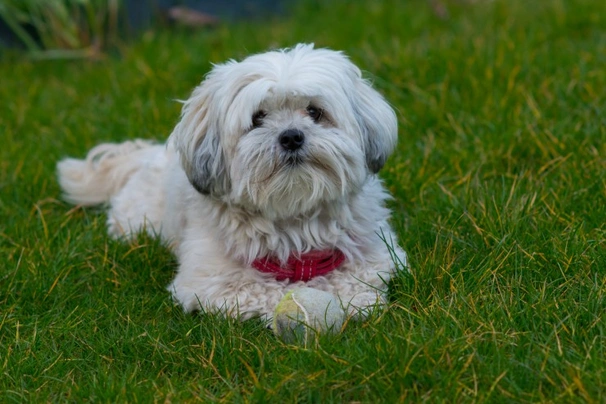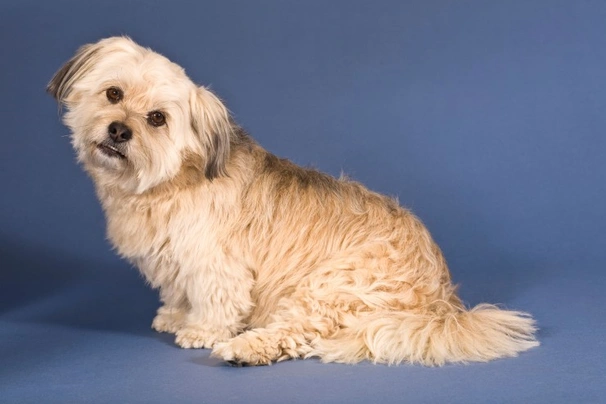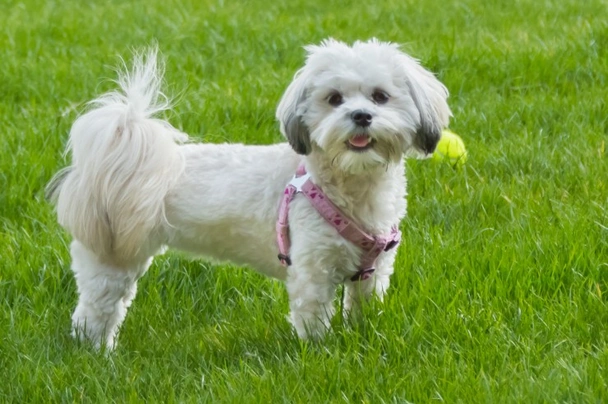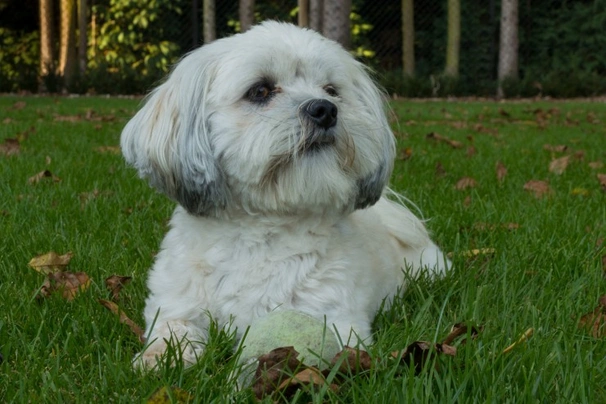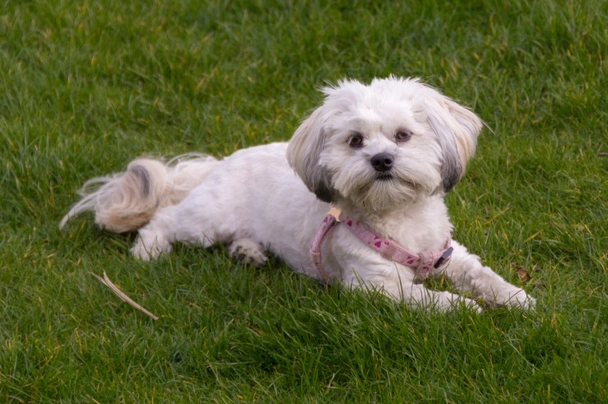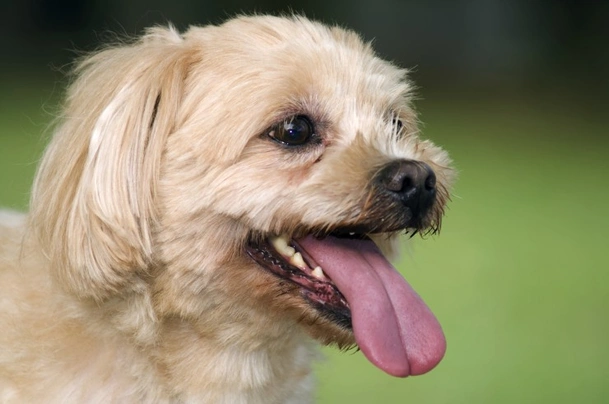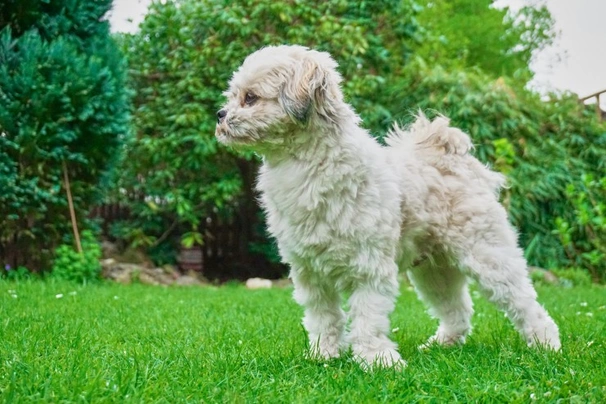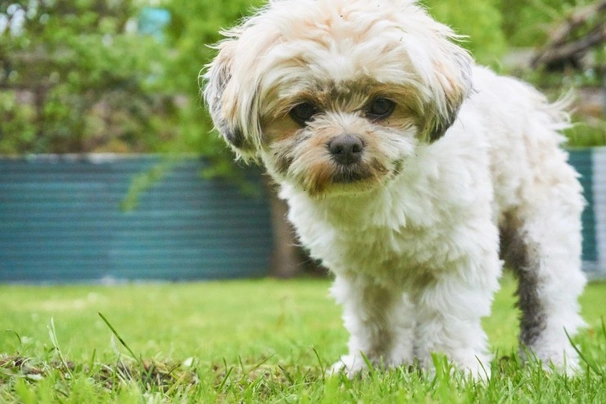Malshi
Pros
Cons
Introduction of the Malshi
The Malshi is the result of crossing two pedigree dogs namely the Maltese and the Shih Tzu. They were developed in the United States because of the demand for low-shedding dogs and the cross proved so successful that their popularity just grew and grew but not only with allergy sufferers. Malshis can inherit the looks and personalities of both parent breeds bearing in mind that every dog is different. When it comes to looks and coat puppies in the same litter can be quite different looking with the one consistent being that most Malshis boast having white coats with some having colour combinations coats too.
Today these charming dogs have become so popular they have found their way into the hearts and homes of many people who have never suffered from any sort of allergy. The reason being that Malshis are such a pleasure to have around because of their kind affectionate and happy natures their extremely cute looks and with the added bonus of having low shedding coats.
History of the Malshi
The Malshi first appeared on the scene back in the 1990's when breeders wanted to create a small low-shedding companion dog for allergy sufferers. From the outset these little dogs proved to be extremely popular in Australia as well as North America. They have also become a popular choice here in the UK and not necessarily with people who suffer from any sort of pet related allergy thanks to their adorable looks and friendly kind natures.
To date Malshis are not recognised as a breed by The Kennel Club (October) or any other international breed organisation. However local breed clubs have been founded in different countries with an end goal being to breed these charming hybrid dogs responsibly so that puppies remain healthy with an acceptable conformation with responsible breeders never breeding Malshis that are too small. For the moment the majority of Malshis are first generation dogs although more second-generation litters are now becoming available and it's very important that all prospective owners ask breeders to see the results of health tests of known hereditary and congenital disorders that affect parent breeds namely the Shih Tzu and the Maltese before buying a puppy from them.
Interesting facts about the breed
- Is the Malshi a vulnerable breed? No they are among some of the most popular hybrid/designer dogs in the UK
- They were first bred in the United States during the 1990s
- They are a popular choice for allergy sufferers thanks to their non-shedding coats
- They have become one of the more popular hybrid/designer dogs in the world
Appearance of the Malshi
Height at the withers: Males 25 - 28 cm Females 25 - 28 cm
Average weight: Males 2.3 - 6.8 kg Females 2.3 - 6.8 kg
Malshis are very cute little dogs that have inherited many of their parent breed's charming looks and traits. Because most Malshis are first generation puppies from the same litter can be very different both in looks and personality because it depends on whether they have thrown to the Maltese or the Shih Tzu. However they don't usually have the short nose or the protruding eyes that are so typical of the Shih Tzu.
They have nicely proportioned heads with charming dark round eyes and short muzzles nicely finished off with dark noses and dark coloured tight lips. Their ears are set wide apart and quite high on a dog's head falling forwards when these little dogs are excited but they hang down to the side when relaxed. The Malshi has a strong jaw with a perfect scissor bite where their upper teeth neatly overlap their lower ones.
They have nice broad chests for such small dogs and straight short but strong front legs. Shoulders are nicely laid back and backs are level with dogs having well rounded loins. Bellies show a slight tuck up which adds to a Malshis athletic appearance. Back legs are well muscled and strong and their feet are small being cat-like with strong nails and paw pads.
When it comes to their coat the Malshi usually has a loose wavy coat depending on which of the parent breeds they have thrown to with some dogs having more of a Shih Tzu type coat whereas others have more of a Maltese type coat but then some Malshis can have a mixture of both. The most commonly seen colours in Malshis are as follows:
- Cream with or without tan markings
- White with or without tan markings
- Black
- Brown
- Black and white
- Brown and white
- Black and brown
It is worth noting that a lot of Malshis have mainly white coats with black or brown around their ears and faces.
Gait/movement
When a Malshi moves they do so with a gay and happy manner always on the alert and ready to be involved in everything that goes on around them.
Faults
Prospective Malshi owners should be wary of any puppies or dogs that show any sort of exaggeration whether in their looks or conformation and that extra-small Malshis often come with many health issues so they are best avoided. A responsible breeder would always ensure that puppies they produce are of a good size and conformation and would avoid breeding extra small dogs for these reasons. Responsible breeders would also have their stud dogs BAER tested for congenital deafness. Males should have both testicles fully descended into their scrotums.
Temperament of the Malshi
The Malshi is a charming character and one that can inherit many of their parent breed's personality traits. This includes being active to the point of being a little boisterous when the mood takes them. They have inherited their parent breed's intelligence too and when they are tired after a good walk they are happy to chill out and relax on the sofa with their owners.
They tend to form very strong bonds with their families which is very endearing although it can turn into a bit of a problem if a Malshi ever needs to be left on their own for a little while because it can really stress them out. They can develop separation anxiety which sees them being neurotic and destructive around the home when they are left to their own devices. The Malshi thrives on human company and is never happier when they are with the people they love which can prove a problem. As such they are best suited to families where one person usually stays at home when everyone else is out.
It's essential for Malshis to be well socialised from a young enough age so they grow up to be well-rounded mature dogs. This must include introducing a dog to lots of new situations noises people other animals and dogs once they have been fully vaccinated. If they are not well socialised Malshis can be a little "snappy" and highly strung when they find themselves in situations that make them feel uncomfortable or nervous.
They are the perfect choice for people who live in apartments and who lead quieter more sedentary lives. They are also a good choice for first time owners because they are so affectionate loyal and eager to please which means they learn new things very quickly. However they need to be trained and handled like any other dog which means a Malshi should never be allowed to get away with too much or pampered because it could result in them becoming wilful and unruly.
Are they a good choice for first time owners?
Malshis are the perfect choice for first time dog owners because they are so amenable and people-oriented loving nothing more than to please and to entertain their families. They are particularly good with older children and the elderly too although playtime can often get a bit boisterous at times.
What about prey drive?
Malshis are very social by nature and even though they have working and hunting dogs in their lineage they do not have a very high prey drive. However this is not to say that a dog would not give chase to a smaller animal when the mood takes them and this includes squirrels and the cat from next door just for the fun of it.
What about playfulness?
Malshis have a very playful side to their natures and love to entertain and be entertained. They are known to be a little mischievous when the mood takes them and being so clever they quickly learn what pleases their owners but are always ready to test the limits and boundaries to see just how much they can get away with.
What about adaptability?
Malshis are highly adaptable dogs and providing they are given enough daily physical exercise combined with as much mental stimulation to prevent boredom from setting in they are just as happy living in an apartment in town as they are living in a house with a garden in the country.
What about separation anxiety?
As previously mentioned Malshis form strong ties with their families and dogs are never very happy when they find themselves left on their own for longer periods of time. They are better suited to people who either work from home or in households where one person stays at home when everyone else is out so they are never alone for any length of time which could see a dog suffering from separation anxiety. This can lead to them being destructive around the home which is a dog's way of relieving any stress they are feeling and a way to keep themselves entertained.
What about excessive barking?
Some Malshis like the sound of their own voices a little too much which is something that needs to be gently nipped in the bud when a dog is still young being careful not to frighten them. With this said a lot of dogs bark at the slightest thing or just for the sake of it no matter how much an owner tries to prevent them from doing so. Like many other small dogs the more tired they are the less chance there is of them barking unnecessarily. In short with Malshis the old saying of a "tired dog is a good dog" is never truer.
Do Malshis like water?
Some Malshis like swimming and will take to the water whenever they can more especially when the weather is hot. However if anyone who owns a dog that does not like water should never force them to go in because it would just end up scaring them. With this said care should always be taken when walking a Malshi off the lead anywhere near more dangerous watercourses just in case a dog decides to leap in and then needs rescuing because they can't get out of the water on their own.
Are Malshis good watchdogs?
Malshis are not natural watchdogs although this is not to say a dog would not be quick off the mark to let an owner know when there are strangers about although they would rarely do this aggressively preferring to hang back and bark to alert their owners that something is wrong.
Intelligence / Trainability of the Malshi
Malshis are clever little dogs and they love to please which means in the right hands and environment they are easy to train and they learn new things very quickly. However the downside to this is they are just as quick to learn some bad behaviours if they are allowed to get away with too much too often. Because Malshis are so cute it’s all too easy to pamper them a little too much which can result in dogs becoming wilful and unruly making them harder to handle and live with. They can even develop a condition known as "Small Dog Syndrome" which can see them being neurotic and continually stressed out.
A Malshi's training must start as soon as a puppy arrives in their new home when boundaries should be set so they understand the "limits". Their training can start in earnest once they have been fully vaccinated and it's always a good idea to enroll them into puppy classes which is not only a great way of socialising a dog but it also means they can start their training in a safe and controlled environment surrounded by other dogs and people.
Malshi puppies are incredibly cute and it is all too easy to spoil them when they first arrive in a new home. However like many other small dogs they can develop a condition known as "small dog syndrome" which see them being unruly and wilful making them harder to live with and handle. All dogs need to be taught their place in the "pack" and who is the alpha dog in a household which means setting out boundaries so that a Malshi puppy understands what type of behaviour is acceptable and which are not. The first commands to teach a puppy are as follows:
- Come
- Sit
- Stay
- Quiet
- Leave it
- Down
- Bed
Children and other
The Malshi thrives in a family environment and loves nothing more than to be involved in everything that goes on around them. However they are not the best choice for families with younger children but they are fine in households where the kids are slightly older and who therefore know how to behave around such small dogs. With said any interaction between toddlers and a dog should always be supervised by an adult to make sure things stay nice and calm because Malshis are never happy when things get too noisy which can result in them being a bit “snappy”.
They are known to be good around other dogs especially if a Malshi has been well socialised from a young enough age. They also generally get on with other pets they have grown up with in the home and this includes the family cat. However a Malshi might just chase any other cats that cross their paths. It's a good idea to keep an eye on dogs when they are around smaller animals just to be on the safe side.
Health of the Malshi
The average life expectancy of a Malshi is between 12 and 14 years when properly cared for and fed an appropriate good quality diet to suit their ages.
The Malshi is known to suffer from a few hereditary health issues that affect the Maltese and the Shih Tzu which are worth knowing about if you are planning share your home with one of these energetic little dogs. The conditions that seem to affect the breed the most include the following:
Maltese
- Chiari malformation syringomyelia - dogs can be screened for the condition
- Acquired tremour syndrome
- Necrotising meningoencephalitis
- Myxomatous degeneration of the mitral valve
- Patent ductus arteriosus
- Pyloric stenosis
- Portosystemic shunt
- Cataracts
- Entropion(Eyelids Folding Inwards)
- Hydrocephalus
- Patellar luxation
- Hereditary deafness - dogs should be BAER tested through the Animal Health Trust
- Hypothyroidism
Shih Tzu
- Hip Dysplasia - stud dogs should be hip scored
- Breathing issues - pinched nostrils and soft palate
- Hernias
- Dental problems
- Bladder stones
- Progressive retinal atrophy (PRA) - DNA tests are becoming available but they are breed specific with none yet available for Shih Tzus
- Renal dysplasia
- Allergies
- Autoimmune diseases
- Diabetes
- Inflammatory bowel disease
- Autoimmune haemolytic anaemia
- Immune mediated thrombocytopaenia
- Hyperthyroidism
- Eye injuries
What about vaccinations?
Malshi puppies would have been given their initial vaccinations before being sold but it is up to their new owners to make sure they have their follow-up shots in a timely manner with the vaccination schedule for puppies being as follows:
- 10 -12 weeks old bearing in mind that a puppy would not have full protection straight away but would be fully protected 2 weeks after they have had their second vaccination
There has been a lot of discussion about the need for dogs to have boosters. As such it's best to talk to a vet before making a final decision on whether a dog should continue to have annual vaccinations which are known as boosters.
What about spaying and neutering?
A lot of vets these days recommend waiting until dogs are slightly older before spaying and neutering them which means they are more mature before undergoing the procedures. As such they advise neutering males and spaying females when they are between the ages of 6 to 9 months old and sometimes even when a dog is 12 months old.
Other vets recommend spaying and neutering dogs when they are 6 months old but never any earlier unless for medical reasons. With this said many breeds are different and it is always advisable to discuss things with a vet and then follow their advice on when a dog should be spayed or neutered.
What about obesity problems?
Some Malshis gain weight after they have been spayed or neutered and it's important to keep an eye on a dog's waistline just in case they do. If a dog starts to put on weight it's important to adjust their daily calorie intake and to up the amount of exercise they are given. Older dogs too are more prone to gaining weight and again it's essential they be fed and exercised accordingly because obesity can shorten a dog's life by several years. The reason being that it puts a lot of extra strain on a dog's internal organs including the heart which can prove fatal.
What about allergies?
Malshis are prone to suffering from allergies and it's important for a dog to see a vet sooner rather than later if one flares up. Allergies can be notoriously hard to clear up and finding the triggers can be challenging. With this said a vet would be able to make a dog with an allergy more comfortable while they try to find out the triggers which could include the following:
- Certain foods that contain high levels of grain and other cereal fillers
- Airborne pollens
- Dust mites
- Environment
- Flea and tick bites
- Chemicals found in everyday household cleaning products
Participating in health schemes
All responsible Malshi breeders would ensure that their stud dogs are tested for known hereditary and congenital health issues known to affect the breed by using the following schemes:
- Maltese - Hereditary deafness BAER test through The Animal Health Trust (AHT) Chiari malformation syringomyelia
- Shih Tzu - stud dogs should be hip scored
What about breed specific breeding restrictions?
There are no breed specific breeding restrictions in place for the Malshi but all breeders should follow the Kennel Club breeding recommendations even though Malshis are not KC recognised to ensure puppies are bred responsibly.
What about Assured Breeder Requirements?
There are no Assured Breeder requirements in place for Malshis because they are not a Kennel Club registered breed. However all prospective owners should contact reputable breeders who routinely have their stud dogs tested for known hereditary and congenital health issues known to affect the Maltese and the Shih Tzu.
Caring for the Malshi
As with any other breed Malshis need to be groomed on a regular basis to make sure their coats and skin are kept in top condition bearing in mind that some dogs are prone to suffering from skin allergies. They also need to be given regular daily exercise to ensure they remain fit and healthy. On top of this dogs need to be fed good quality food that meets all their nutritional needs throughout their lives.
Caring for a Malshi puppy
Malshi puppies are boisterous and full of life which means it's essential for homes and gardens to be puppy-proofed well in advance of their arrival. A responsible breeder would have well socialised their puppies which always leads to more outgoing confident and friendly dogs right from the word go. With this said any puppy is going to feel vulnerable when they leave their mother and littermates which must be taken into account. The longer a puppy can remain with their mother the better although it should never be for too long either.
It's best to pick a puppy up when people are going to be around for the first week or so which is the time needed for a puppy to settle in. Puppy-proofing the home and garden means putting away any tools and other implements that a boisterous puppy might injure themselves on. Electric wires and cables must be put out of their reach because puppies love chewing on things. Toxic plants should be removed from flowerbeds and the home too.
Puppies need to sleep a lot to grow and develop as they should which means setting up a quiet area that's not too out of the way means they can retreat to it when they want to nap and it's important not to disturb them when they are sleeping. It's also a good idea to keep "playtime" nice and calm inside the house and to have a more active "playtime" outside in the garden which means puppies quickly learn to be less boisterous when they are inside.
The documentation a breeder provides for a puppy must have all the details of their worming date and the product used as well as the information relating to their microchip. It is essential for puppies to be wormed again keeping to a schedule which is as follows:
- Puppies should be wormed at 6 months old
- They need to be wormed again when they are 8 months old
- Puppies should be wormed when they are 10 months old
- They need to be wormed when they are 12 months old
Things you'll need for your puppy
There are certain items that new owners need to already have in the home prior to bringing a new puppy home. It's often a good idea to restrict how much space a puppy plays in more especially when you can't keep an eye on what they get up to bearing in mind that puppies are often quite boisterous which means investing in puppy gates or a large enough playpen that allows a Malshi puppy the room to express themselves while keeping them safe too. The items needed are therefore as follows:
- Good quality puppy or baby gates to fit on doors
- A good well-made playpen that's large enough for a puppy to play in so they can really express themselves as puppies like to do
- Lots of well-made toys which must include good quality chews suitable for puppies to gnaw on bearing in mind that a puppy will start teething anything from when they are 3 to 8 months old
- Good quality feed and water bowls which ideally should be ceramic rather than plastic or metal
- A grooming glove
- A slicker brush or soft bristle brush
- Dog specific toothpaste and a toothbrush
- Scissors with rounded ends
- Nail clippers
- Puppy shampoo and conditioner which must be specifically formulated for use on dogs
- A well-made dog collar or harness
- A couple of strong dog leads
- A well-made dog bed that's not too small or too big
- A well-made dog crate for use in the car and in the home that's large enough for a puppy to move around in
- Baby blankets to put in your puppy's crate and in their beds for when they want to nap or go to sleep at night
Keeping the noise down
All puppies are sensitive to noise including Malshi puppies. It's important to keep the noise levels down when a new puppy arrives in the home. TVs and music should not be played too loud which could end up stressing a small puppy out.
Keeping vet appointments
As previously mentioned Malshi puppies would have been given their first vaccinations by the breeders but they must have their follow up shots which is up to their new owners to organise. The vaccination schedule for puppies is as follows:
- 10 -12 weeks old bearing in mind that a puppy would not have full protection straight away but would only be fully protected 2 weeks after they have had their second vaccination
When it comes to boosters it's best to discuss these with a vet because there is a lot of debate about whether a dog really needs them after a certain time. However if a dog ever needed to go into kennels their vaccinations would need to be
What about older Malshis when they reach their senior years?
Older Malshis need lots of special care because as they reach their golden years they are more at risk of developing certain health concerns. Physically a dog's muzzle may start to go grey but there will be other noticeable changes too which includes the following:
- Coats become coarser
- A loss of muscle tone
- Malshis can either become overweight or underweight
- They have reduced strength and stamina
- Older dogs have difficulty regulating their body temperature
- They often develop arthritis
- Immune systems do not work as efficiently as they once did which means dogs are more susceptible to infections
Older dogs change mentally too which means their response time tends to be slower as such they develop the following:
- They respond less to external stimuli due to impaired vision or hearing
- They tend to be a little pickier about their food
- They have a lower pain threshold
- Become intolerant of any change
- Often an older dog can feel disorientated
Living with a Malshi in their golden years means taking on a few more responsibilities but these are easily managed and should include taking a look at their diet the amount of exercise they are given how often their dog beds need changing and keeping an eye on the condition of their teeth.
Older Malshis need to be fed a good quality diet that meets their needs at this stage of their lives all the while keeping a close eye on a dog's weight. A rough feeding guide for older dogs is as follows bearing in mind they should be fed highly digestible food that does not contain any additives:
- Protein content should be anything from 14 – 21%
- Fat content should be less than 10%
- Fibre content should be less than 4%
- Calcium content should be 0.5 – 0.8%
- Phosphorous content should be 0.4 – 0.7%
- Sodium content should be 0.2 – 0.4%
Older Malshis don't need to be given the same amount of daily exercise as a younger dog but they still need the right amount of physical activity to maintain muscle tone and to prevent a dog from putting on too much weight. All dogs need access to fresh clean water and this is especially true of older dogs when they reach their golden years because they are more at risk of developing kidney disorders.
Grooming of the Malshi
A Malshi typically has a long silky and wavy coat that's soft to the touch. Their coats need to be brushed daily to prevent any knots or tangles from forming. Ideally they need to be professionally clipped every 6 to 9 weeks which makes taking care of their coats that much easier in between visits to a grooming parlour. Because Malshis often suffer from tear staining under their eyes it's important to regularly wipe these away using a soft damp cloth.
It's also important to check a dog's ears on a regular basis and to clean them when necessary. If too much wax builds up in a dog's ears it can lead to a painful infection which can be hard to clear up. In short prevention is often easier than cure when it comes to ear infections.
Exercise of the Malshi
The Malshi is a high energy little dog and one that boasts being very smart. As such they need to be given the right amount of daily exercise and mental stimulation for them to be truly happy and well-rounded. They need from 20 to 30 minutes exercise a day with as much off the lead time as possible. If they are not given the right amount of mental stimulation and exercise every day a Malshi would quickly get bored and could even begin to show some destructive behaviours around the home which is their way of relieving any stress they may be feeling.
A shorter walk in the morning would be fine but a longer more interesting one in the afternoon is a must. These dogs also like to be able to roam around a back garden as often as possible so they can really let off steam. However the fencing must be extremely secure to keep these energetic dogs in because if they find a weakness in the fence they will soon escape out and get into all sorts of trouble.
With this said puppies should not be over exercised because their joints and bones are still growing. This includes not letting a dog jump up and down from furniture or going up or down the stairs. Too much pressure placed on their joints and spines at an early age could result in a dog developing serious problems later in their lives.
Feeding of the Malshi
Feeding guide for a Malshi puppy
Puppies need to be fed a highly nutritious good quality diet for them to develop and grow as they should. As a rough guide a Malshi puppy can be fed the following amounts every day making sure their meals are evenly spread out throughout the day and it's best to feed them 3 or 4 times a day:
- 2 months old - 48g to 112g depending on puppy's build
- 3 months old - 54g to 128g depending on puppy's build
- 4 months old - 55g to 134g depending on puppy's build
- 5 months old - 55g to 135g depending on puppy's build
- 6 months old - 47g to 134g depending on puppy's build
- 7 months old - 40g to 122g depending on puppy's build
- 8 months old - 39g to 110g depending on puppy's build
- 9 months old - 39g to 99g depending on puppy's build
- 10 months old - 39g to 98g depending on puppy's build
Once a puppy is 11 months old they can be fed adult dog food.
Feeding guide for an adult Malshi
Once fully mature an adult Malshi must be fed a good quality diet to ensure their continued good health. As a rough guide an adult Malshi can be fed the following amounts every day:
- Dogs weighing 2.5 kg can be fed 45g to 50g depending on activity
- Dogs weighing 3 kg can be fed 55g to 63g depending on activity
- Dogs weighing 4 kg can be fed 68g to 79g depending on activity
- Dogs weighing 5 kg can be fed 80g to 93g depending on activity
- Dogs weighing 6 kg can be fed 92g to 106g depending on activity
- Dogs weighing 7 kg can be fed 103g to 119g depending on activity
Malshi price
If you are looking to buy a Malshi you would need to pay anything from £300 to over £900 for a well-bred pedigree puppy. The cost of insuring a male 3-year-old Malshi in northern England would be £23.43 a month for basic cover but for a lifetime policy this would set you back £44.45 a month (quote as of Bebruary 2018). When insurance companies calculate a pet's premium they factor in several things which includes where you live in the UK a dog's age and whether they have been neutered or spayed among other things.
When it comes to food costs you need to buy the best quality food whether wet or dry making sure it suits the different stages of a dog’s life. This would set you back between £20 - £30 a month. On top of this you need to factor in veterinary costs if you want to share your home with a Malshi and this includes their initial vaccinations their annual boosters the cost of neutering or spaying a dog when the time is right and their yearly health checks all of which quickly adds up to over £800 a year.
As a rough guide the average cost to keep and care for a Malshi would be between £50 to £80 a month depending on the level of insurance cover you opt to buy for your dog but this does not include the initial cost of buying a responsibly bred healthy Malshi puppy bred from health tested parents.
Buying advice
When visiting and buying any puppy or dog there are many important things to consider and questions to ask of the breeder/seller. You can read our generic puppy/dog advice here which includes making sure you see the puppy with its mother and to verify that the dog has been wormed and microchipped.
Malshis have fast become a popular hybrid/designer dog both in the UK and elsewhere in the world which means that well-bred puppies command a lot of money. As such with Malshis there is specific advice questions and protocols to follow when buying a puppy which are as follows:
- Beware of online scams and how to avoid them. You may see online and other adverts by scammers showing images of beautiful Malshi puppies for sale at very low prices. However the sellers ask buyers for money up front before agreeing to deliver a puppy to a new home. Potential buyers should never buy a puppy unseen and should never pay a deposit or any other money online to a seller. You should always visit the pet at the sellers home to confirm they are genuine and make a note of their address.
- As previously touched upon Malshis are among the more popular dogs in the UK. As such there are many amateur breeders/people who breed from dam far too often so they can make a quick profit without caring for the welfare of the puppies their dam or the breed in general. Under Kennel Club rules a dam can only produce 4 litters and she must be between a certain age to do so. Anyone wishing to buy a Malshi puppy should think very carefully about who they purchase their puppy from and should always ask to see the relevant paperwork pertaining to a puppy's lineage their vaccinations and their microchipping.
- Prospective Malshi owners should be very careful when considering buying an extra small puppy because all too often they suffer from very serious health issues and no responsible breeder would purposefully breed dogs so they are too small. They should also ask breeders if Maltese parent dogs have been BAER tested for congenital deafness and that Shih Tzu parent dogs have been hip scored.

Shih tzu x Maltese
£750
Maltese x Shih Tzu = Malshi
£875
